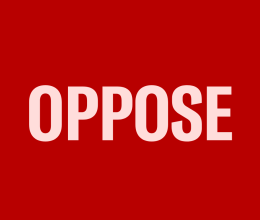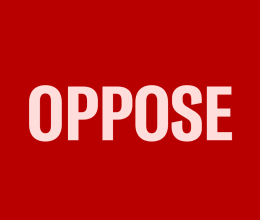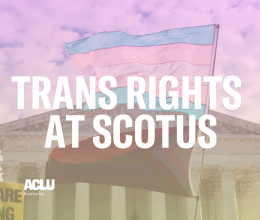
WASHINGTON, DC - This morning, the Supreme Court issued its ruling in U.S. v. Skrmetti, a challenge brought by three transgender adolescents, their families, and a Memphis-based medical provider against a Tennessee law banning gender-affirming hormone therapies for transgender people under 18.
The Court agreed with parts of the Sixth Circuit’s opinion that allowed the law to take effect, holding that Tennessee’s SB1 does not draw a sex-based (or a trans status-based) line and thus only necessitates deferential review by the courts. That means SB1 can remain in effect. Notably, however, the decision is based on the record in and context of the Tennessee case and therefore does not extend to other cases concerning discrimination based on transgender status.
Statement from ACLU-KY Legal Director, Corey Shapiro
“The Supreme Court has failed to protect families’ freedoms and allowed politicians to target transgender youth. This is a painful setback, and it is clear the Court will not protect these children. But it will not stop us from using all available legal tools to fight back against the political extremists targeting transgender people’s safety and dignity. What’s important to remember is that no matter what the Court or politicians say, transgender young people and their families are not alone in this fight.”
Statement from NCLR Legal Director, Shannon Minter
“The Court's ruling abandons transgender youth and their families to political attacks. It ignored clear discrimination and disregarded its own legal precedent by letting lawmakers target young people for being transgender. Healthcare decisions belong with families, not politicians. This decision will cause real harm. Today’s decision is a cruel blow to transgender youth and their families in Kentucky and other states, but we will continue to fight.”
Since 2021, 25 states, including Kentucky, have enacted categorical bans on gender-affirming medical care, such as hormone therapy and puberty-suppressant medications, for treating gender dysphoria in transgender youth yet readily allow those same medications for other and similar purposes for cisgender youth. Over 100,000 transgender people under 18 now live in a state with a ban on their health care.
###
The American Civil Liberties Union (ACLU) of Kentucky is freedom's watchdog, working daily in the courts, legislature and communities to defend individual rights and personal freedoms. For additional information, visit our website at: www.aclu-ky.org.
The National Center for LGBTQ Rights (NCLR) is a national legal organization committed to advancing the human and civil rights of the lesbian, gay, bisexual, transgender, and queer community through litigation, public policy advocacy, and public education. Since its founding, NCLR has maintained a longstanding commitment to racial and economic justice and the LGBTQ community’s most vulnerable. www.nclrights.org.

